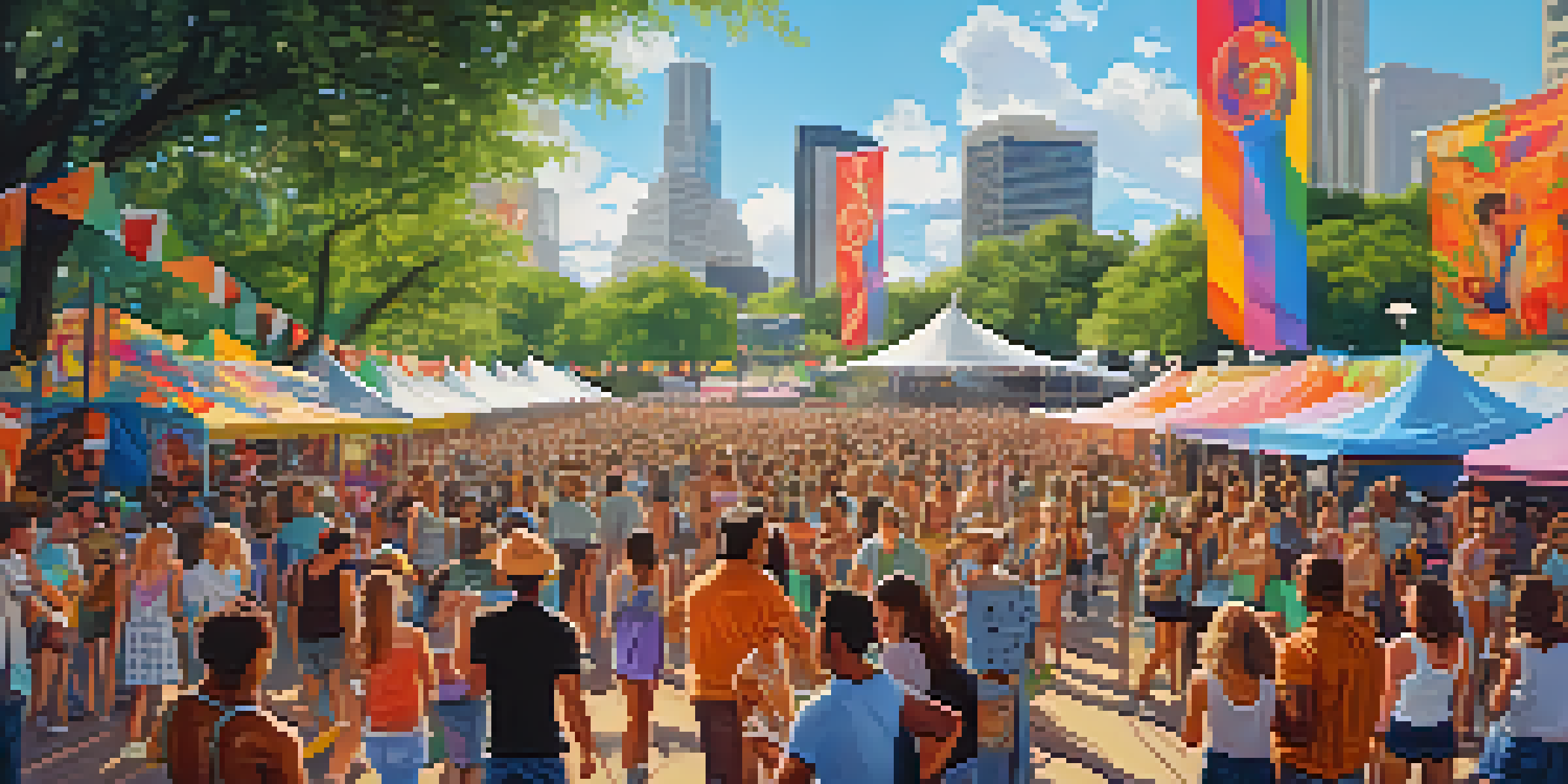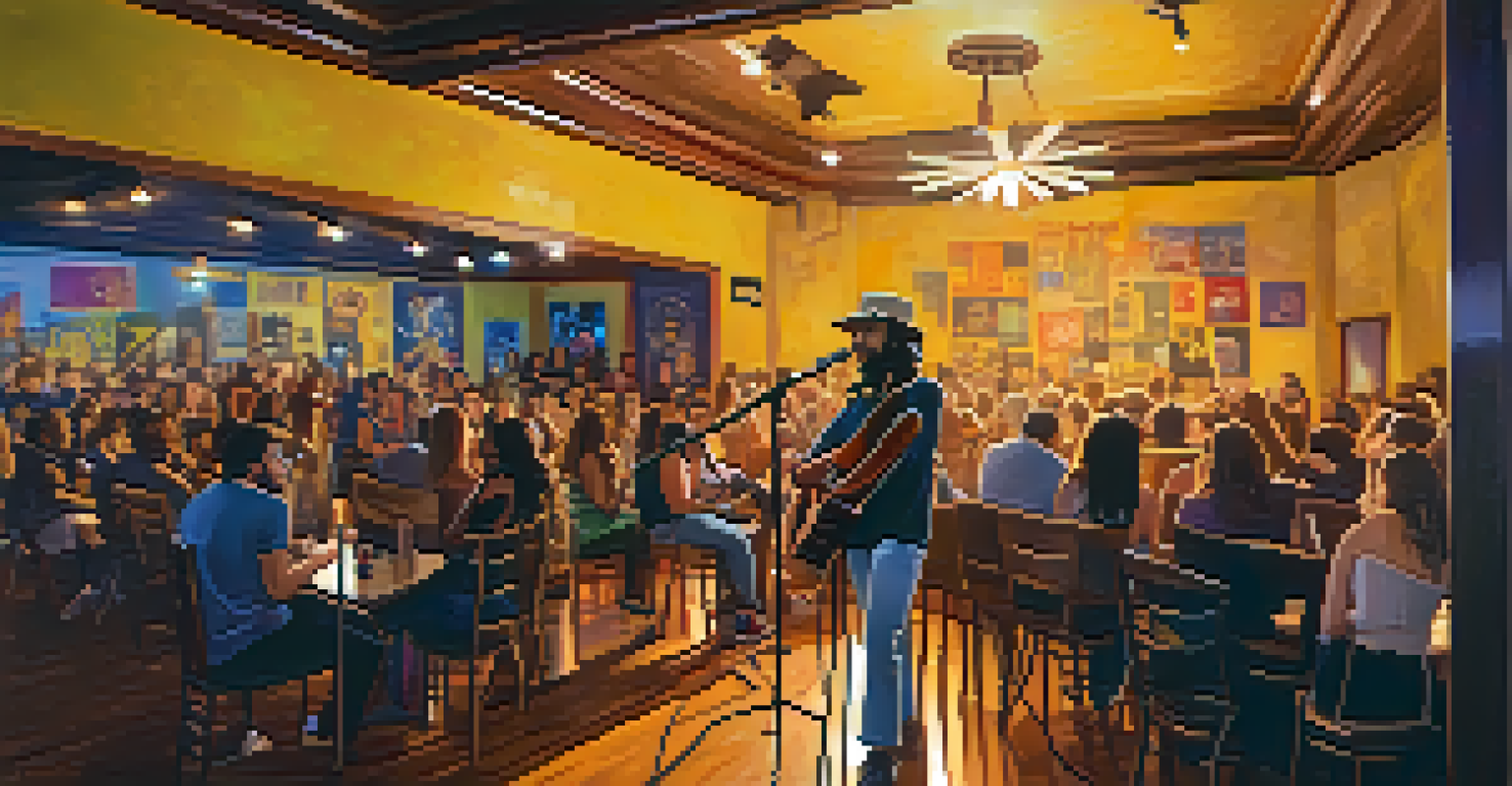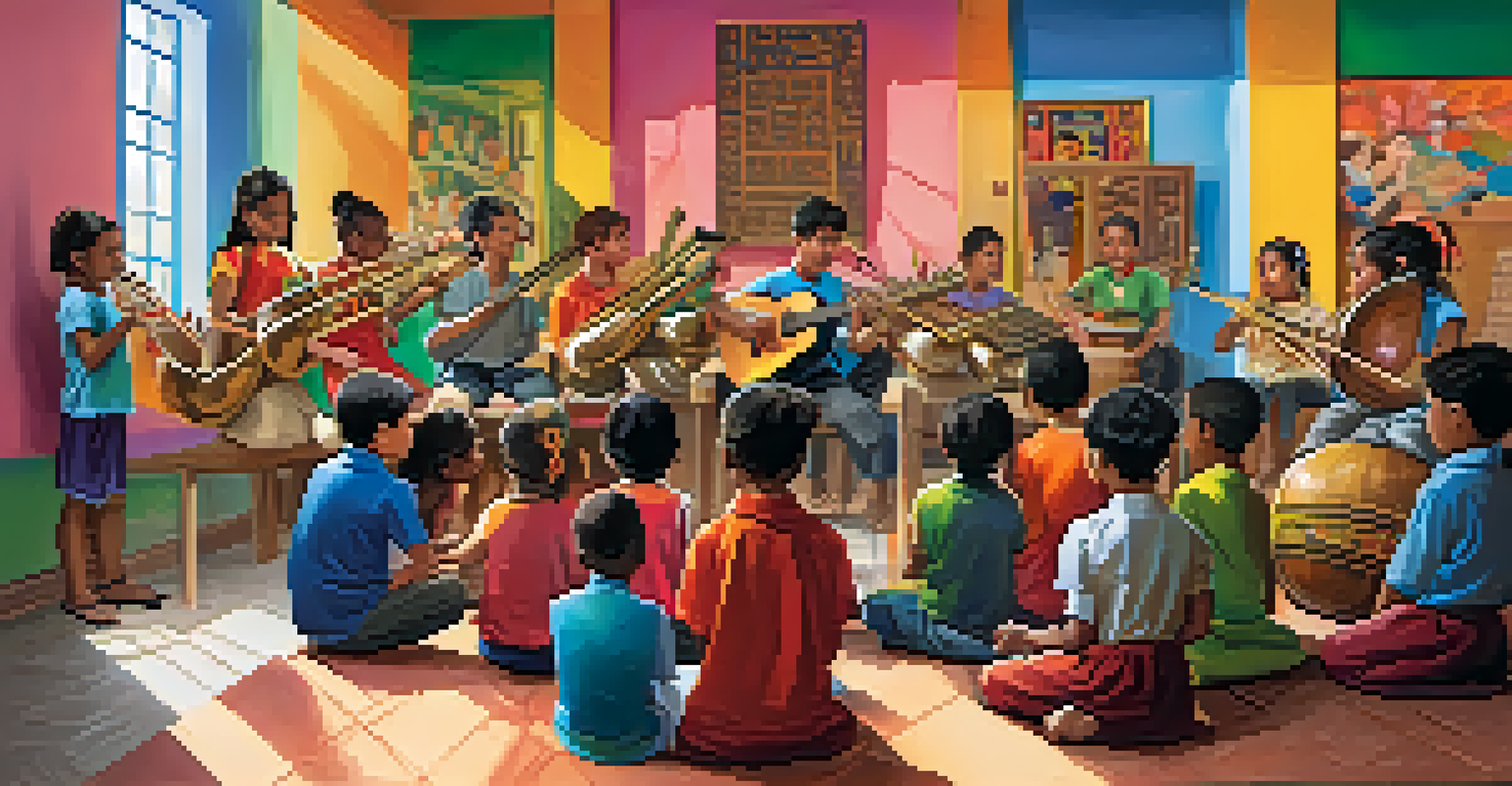Music as a Unifier: The Impact of Cultural Diversity in Austin

Austin: A Melting Pot of Musical Cultures
Austin is often celebrated as a cultural hub, and its music scene is a testament to this diversity. From blues to Tejano, the city showcases a rich tapestry of genres that reflect its multicultural roots. This vibrant mix not only entertains but also brings people together, fostering connections between communities.
Music is the universal language of mankind.
As musicians from various backgrounds come together, they create an environment where cultural exchange thrives. Festivals like South by Southwest (SXSW) highlight this integration, featuring artists from around the globe. These events serve as a reminder of how music transcends barriers and unites people through shared experiences.
Moreover, local venues often host a range of musical acts, providing a platform for both emerging and established artists. This inclusivity encourages collaboration, allowing different musical styles to blend and evolve. In Austin, the soundscape is a reflection of its diverse population, where every performance tells a story.
The Role of Festivals in Celebrating Diversity
Festivals in Austin serve as a celebration of cultural diversity, showcasing a wide array of music. Events like the Austin City Limits Music Festival bring together artists from various backgrounds, creating a unique blend of sounds. These gatherings not only entertain but also educate attendees about different cultures through music.

By featuring international artists, festivals provide a platform for cultural exchange. Attendees have the opportunity to experience sounds and rhythms that they might not encounter otherwise. This exposure broadens perspectives and fosters appreciation for different musical traditions.
Austin's Music Reflects Diversity
The city's vibrant music scene showcases a rich blend of genres that embody its multicultural roots.
Additionally, festivals often incorporate food, art, and workshops, further immersing attendees in diverse cultures. This holistic approach creates a communal atmosphere, where people can connect over shared interests. Ultimately, these events highlight music's power to unify and celebrate differences.
Local Artists: The Voice of Cultural Narratives
Local artists in Austin play a crucial role in expressing cultural narratives through their music. Many musicians draw on their heritage to create songs that resonate with their communities. This storytelling aspect not only preserves cultural traditions but also educates listeners about different backgrounds.
The power of music makes all the difference in the world.
For instance, artists from the Latinx community often incorporate elements of traditional music into contemporary genres. This fusion allows them to honor their roots while reaching wider audiences. Such innovations showcase the dynamic nature of cultural expression within the music scene.
Moreover, local musicians frequently collaborate with one another, creating a sense of solidarity among diverse backgrounds. These partnerships enrich the musical landscape, leading to fresh sounds that reflect the city's identity. In this way, Austin's artists are not just entertainers; they are cultural ambassadors.
Music Education: Bridging Cultural Gaps
Music education in Austin is a vital tool for bridging cultural gaps and promoting understanding. Schools and community programs often emphasize the importance of learning about various musical styles from around the world. By exposing students to diverse genres, they cultivate respect and appreciation for different cultures.
Programs that focus on world music encourage students to engage with the sounds and instruments of different traditions. This hands-on experience fosters creativity and allows young musicians to express themselves in unique ways. Such initiatives are instrumental in shaping a more inclusive society.
Festivals Promote Cultural Exchange
Events like SXSW and Austin City Limits foster cultural appreciation by bringing together artists and audiences from various backgrounds.
Furthermore, workshops and classes led by diverse instructors enable students to learn directly from cultural representatives. This direct interaction not only enhances their musical skills but also builds relationships across communities. Music education ultimately empowers the next generation to carry forward the spirit of unity.
The Influence of Technology on Musical Diversity
In today's digital age, technology plays a significant role in promoting musical diversity in Austin. Streaming platforms and social media have made it easier for artists from various backgrounds to share their music with a global audience. This accessibility allows for a richer exchange of cultural influences.
Additionally, online collaborations enable musicians to connect and create regardless of geographical barriers. This has led to innovative projects that blend different styles, showcasing the beauty of cultural fusion. Technology has transformed how music is produced, distributed, and consumed, amplifying diverse voices.
Moreover, local initiatives leverage technology to promote Austin's music scene. Virtual concerts and live-streamed events have expanded reach, allowing audiences from all over to experience the city's vibrant culture. This digital presence not only celebrates diversity but also creates a sense of community, even in a virtual space.
The Impact of Music on Community Cohesion
Music has a unique ability to foster community cohesion, especially in diverse cities like Austin. Shared musical experiences, whether at a concert or a community gathering, create a sense of belonging among attendees. This collective enjoyment serves as a reminder of our shared humanity, regardless of cultural differences.
Community events often feature local musicians, providing a platform for cultural expression. These gatherings encourage interaction among attendees, fostering friendships and connections that might not have happened otherwise. Music becomes a common language, breaking down barriers and building bridges.
Local Artists as Cultural Ambassadors
Austin's musicians express their heritage through music, preserving traditions while creating innovative sounds that resonate with diverse communities.
Furthermore, local organizations frequently use music as a tool for social change. By highlighting issues through song, artists can inspire dialogue and action within their communities. This transformative power of music reinforces its role as a unifying force, bringing people together for a common cause.
Looking Ahead: The Future of Austin's Musical Landscape
As Austin continues to grow, its musical landscape is likely to evolve along with its diverse population. The influx of new artists and cultures will bring fresh perspectives and sounds, enriching the city's music scene. This ongoing evolution reflects the dynamic nature of cultural exchange that characterizes Austin.
In the coming years, we can expect to see more collaborations that celebrate diversity. As musicians from various backgrounds join forces, they will continue to create innovative and inclusive music. This trend will not only enhance the local scene but also position Austin as a beacon of cultural unity.

Ultimately, the future of music in Austin lies in its ability to adapt and embrace change. By continuing to celebrate its diverse roots, the city can maintain its status as a hub for musical innovation and cultural understanding. Music will remain a powerful unifier, connecting people from all walks of life.